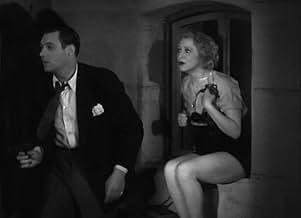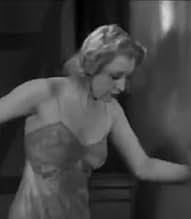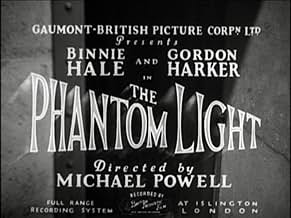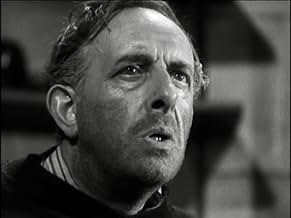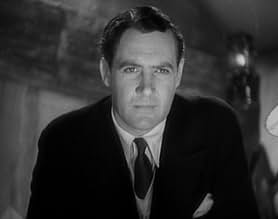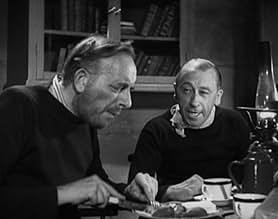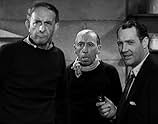A lighthouse keeper has been murdered in mysterious circumstances and, during the ensuing investigation a Phantom Light keeps appearing at the scene of his death.A lighthouse keeper has been murdered in mysterious circumstances and, during the ensuing investigation a Phantom Light keeps appearing at the scene of his death.A lighthouse keeper has been murdered in mysterious circumstances and, during the ensuing investigation a Phantom Light keeps appearing at the scene of his death.
Anthony Holles
- Mr. Mason
- (uncredited)
Ernest Jay
- Railway Worker
- (uncredited)
Vi Kaley
- Woman in Pub
- (uncredited)
John Singer
- Cabin Boy
- (uncredited)
Featured reviews
First off there is a very nice DVD of this mixed with some other British Thrillers. Looks and sounds good. That's great because the movie isn't too gripping and would dissolve with any distractions. The movie is an odd mix of "silent" movie acting and a long set up that takes up way too much time. The welsh village is fun and interesting--there are other later British films that have this same kind of small village opener with a stranger appearing and a mystery being resolved. It's a formula that works more often than not. But the movie fails to really evoke much spookiness of the lighthouse itself. It's never interested in generating any suspense for very long. Usually there is some very brief suspense moment, and it's just to set up more comedy. The comedy is fairly funny but no real sense of danger is generated. No sense of the story moving forward. There are also touches from (then trend setting) Russian montage editing that seem kind of comical in an unintended way. As you'd expect from director Powell there are a few nice camera moves and some good location photography. A music score would have helped this film there is none at all, perhaps a cost saving element? Or just a wrong choice? There are things to enjoy here but you have to get over the 30's cliché elements of "flapper girl" and "spunky-male-reporter" and these are pretty creaky indeed. A movie that, perhaps in a very director Michael Powell way, flirts around with various quirky and occasionally unexpected ideas but doesn't commit to any of them enough to become a whole anything. Other reviews of it being an OK time killer are valid.
Michael Powell's genius is exploding in wondrous innovations and marvels of imagination already in this early film about Wales. The introduction sets the mood, when a Welsh woman as the station master comes to greet a train with its passenger, the new lighthouse guard, in a fantastic local rural costume like a witch and speaking no word of English but only Welsh,. The hysterical intrigues and events are very much reminding of Hitchcock's "Number Seventeen" three years earlier, the same kind of mix of terror and madness, eccentrics and cluster of colliding events, getting grimmer all the time, but the local atmosphere is the dominating charm. It's about wreckers using the local people's readiness for superstition to operate their wicked business, Hitchcock was to use the same theme in "Jamaica Inn" four years later, and both films are equally successful and irresistibly charming and exciting. There is no Charles Laughton and Maureen O'Hara here, but instead you have Gordon Harker who is the right man for the job, although he gets too much to handle. The story is terrific, and Michael Powell was to use much of the same vein in his later masterpiece "I Know Where I Am Going" in Scotland ten years later.
Superficially, this is just another of the many British comedy/dramas from the era. It has a characteristic manner: a fellow with a humorous take on life, a pretty girl, some intrigue and danger.
What sets this apart are two things.
The first is the setting in Wales, or more precisely among the Welsh. Its an odd sort or layering for me since I think the 30's era English are as different, strange, quaint to me as the Welsh are shown here from the English. The language is emphasized in the setup, first half of the movie. They surely are depicted as alien. At the end, there's a clear balance between evil Welsh and noble ones that come to the rescue. The chief villain of course, the ringmaster, is English of course. That Imperial undercurrent!
The second interesting thing is that the action, about 3/5s of the movie, takes place in an actual lighthouse, most at night. What an amazing challenge this must have been; there are no studio shots that I could discern. Its a small, curved structure with no opportunity to anchor the frame against a wall. There's lots of movement across different levels, as there must be, and some clever (from a staging point of view) movement from inside to outside. I suppose the director made up much of how this appears as he went along.
Ted's Evaluation -- 2 of 3: Has some interesting elements.
What sets this apart are two things.
The first is the setting in Wales, or more precisely among the Welsh. Its an odd sort or layering for me since I think the 30's era English are as different, strange, quaint to me as the Welsh are shown here from the English. The language is emphasized in the setup, first half of the movie. They surely are depicted as alien. At the end, there's a clear balance between evil Welsh and noble ones that come to the rescue. The chief villain of course, the ringmaster, is English of course. That Imperial undercurrent!
The second interesting thing is that the action, about 3/5s of the movie, takes place in an actual lighthouse, most at night. What an amazing challenge this must have been; there are no studio shots that I could discern. Its a small, curved structure with no opportunity to anchor the frame against a wall. There's lots of movement across different levels, as there must be, and some clever (from a staging point of view) movement from inside to outside. I suppose the director made up much of how this appears as he went along.
Ted's Evaluation -- 2 of 3: Has some interesting elements.
Gordon Harker arrives at the tiny Welsh village where everyone seems to be named Owen. He's to take over the light house in the bay. He listens to stories about the Ghost Light that led the two earlier masters to their death: the light goes out, another one appears, and guides a ship onto the rocks. "Wreckers" he says, and thinks no more of it. He also doesn't think much of Ian Hunter, who claims to be a reporter and offers him lots of money to go to the lighthouse, nor of Binnie Hale, who also makes the same request. He's proud of his 25 years in the service, and runs things by the book. When he gets to the house, there's a helper who's being tended to by doctor Milton Rosmer. Most of the time he's out, but occasionally he gets up and tries to kill someone with his bare hands.
It's a nicely opened version of the stage play by Evadne Price and Joan Roy Byford., with some nice location shooting in th west counties and Wales. It makes me wonder if this was the inspiration for dirctor Michael Powell to wander the island, far from London, and look at the weird and wonderful way people live far from London.
It's a nicely opened version of the stage play by Evadne Price and Joan Roy Byford., with some nice location shooting in th west counties and Wales. It makes me wonder if this was the inspiration for dirctor Michael Powell to wander the island, far from London, and look at the weird and wonderful way people live far from London.
In '30's British films I've always liked the mix of pithy Music Hall humour, mild ghostliness, a frisson of sex, and manly London chaps saving the day, all displayed perfectly in the Phantom Light. Director Michael Powell's best stuff was yet to come of course, but this can be seen as him still learning his craft practising with more inconsequential trifles.
Gordon Harker here shines with some cracking comedy lines handed to him, as the new lighthouse-keeper at a rather ... insular Welsh coastal village, apparently 200 years behind the times with Wrecking ships on the rocks still big business. Ian Hunter is the manly Londoner with all the brains ... er, I think this was his last British film until after the War ended. He was the best King Richard Hollywood ever had! Until the last reel Binnie Hale has no brains but admirably compensates with long legs. Herbert Lomas perfects the character he particularly re-used later in Ask a Policeman and The Ghost Train - he was even back in Powell & Pressburger's I Know Where I'm Going! But the film that borrowed the most from this was Arthur Askey's Back Room Boy from '42, it even looked the same inside the lighthouse!
A pleasant 75 minutes spent in the company of familiar faces and story.
Gordon Harker here shines with some cracking comedy lines handed to him, as the new lighthouse-keeper at a rather ... insular Welsh coastal village, apparently 200 years behind the times with Wrecking ships on the rocks still big business. Ian Hunter is the manly Londoner with all the brains ... er, I think this was his last British film until after the War ended. He was the best King Richard Hollywood ever had! Until the last reel Binnie Hale has no brains but admirably compensates with long legs. Herbert Lomas perfects the character he particularly re-used later in Ask a Policeman and The Ghost Train - he was even back in Powell & Pressburger's I Know Where I'm Going! But the film that borrowed the most from this was Arthur Askey's Back Room Boy from '42, it even looked the same inside the lighthouse!
A pleasant 75 minutes spent in the company of familiar faces and story.
Did you know
- TriviaWhen Alice Bright (Binnie Hale) remarks that she had just been performing in a play, Sam Higgins (Gordon Harker) retorts, "East Lynne?" This is a reference to the oft produced play and movie of Mrs. Henry Wood's novel of the same name. "East Lynne" was enjoyed for its mad plot and frequently incomprehensible dialogue.
- GoofsSam Higgins arrives at Tan y Bwlch to take a boat to the North Stack lighthouse offshore. Both places exist but are about 60 miles apart. Tan y Bwlch is on the shore of a reservoir, not the sea, and North Stack lighthouse, on the isle of Anglesey, is onshore, not off.
- Quotes
Alice Bright: Mr Higgins. I'm going to tell you the truth. I'm an actress, hiding from the police.
Sam Higgins: What, you act as bad as all that?
- ConnectionsFeatured in Made in England: The Films of Powell and Pressburger (2024)
Details
- Runtime
- 1h 16m(76 min)
- Color
- Aspect ratio
- 1.37 : 1
Contribute to this page
Suggest an edit or add missing content

